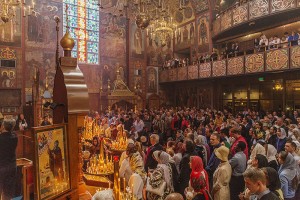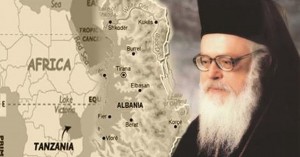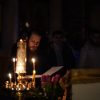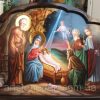What is the role and task of Orthodox Christians in America? Too often we want solutions to problems which we have not formulated, progress toward a point which we have not yet defined, victories in battles in which we don’t know who is fighting whom.
The time has come to clarify the issues, to formulate the problems we face together, to discuss the solutions and the priorities in our existence as Orthodox in a Western country which is our country. Are we a group of exiles? Are we a spiritual and cultural ghetto, to be perpetuated against all odds? Are we to dissolve ourselves here in what is called “the American way of life”? What is this American way of life?
It is my purpose to deal with the fundamental framework of these questions. In my first lecture to freshmen at Saint Vladimir’s Seminary, I always use the same symbol: If you have a big library and move into a new house, you can’t use that library unless you build shelves. While it is still in boxes, you own that library, but it is of no use to you. My purpose, then, is to build the shelves and then to try to see what are the priorities of our Orthodox situation today.
It is impossible to speak about our situation in America unless we refer it to our normal and essential term of reference, the Orthodox Church. The Orthodox Church–whether Greek, Syrian, Serbian, Romanian, or Bulgarian–has always been both the heart and the form of an Orthodox world. Only here in the West, and for the first time in the history of Orthodoxy, do we think of the Church in terms only of a religious institution such as diocese, parish, and so on. No one in organically Orthodox countries has ever thought of the Church as being distinct from the totality of life. Since the conversion of Constantine, the Church was organically related to society, culture, education, family, etc. There was no separation, no dichotomy. The Russian word for peasant is simply christianin, which at the beginning obviously meant Christian.
Here, then, we find the first radical difference which we have to face in America: We belong to the Orthodox Church, but we do not belong to an Orthodox culture. This is the first and most important change, and unless we understand that this is not an academic proposition, but the real framework of our existence, we will not see clearly through our situation. For everything in the Orthodox Church points toward a way of life; the Church is connected to all aspects of life. Yet we are deprived of this connection because, upon leaving our churches on Sunday morning, we return to a culture which was not produced, shaped, or inspired by the Orthodox Church and which, therefore, in a way is deeply alien to Orthodoxy.
CULTURES IN COLLISION
The first Orthodox immigrants in America never thought about all this, for in many ways they continued to live within an organic Orthodox “culture.” They were still living within that type of unity because they belonged to what in American sociology is known as a “sub-culture.” After the liturgy, Russians or Greeks would meet in the church hall, and they would meet not only as Orthodox but as Russians or Greeks or Bukovenians or Carpatho-Russians-and they would meet precisely in order to breathe their native culture.
At the beginning, all this was completely normal. Even today you can live in certain places as if you were not living in America. You can live there without knowing very much English, without any real contact with American culture. But whether we like it or not, that “immigrant” chapter of our history is coming to an end, and this is where the younger generation comes in.
Today’s Orthodox young people do not have that immigrant mentality. Orthodoxy for them is not primarily the remembrance of childhood abroad. They will not keep Orthodoxy simply because it is “the faith of their fathers.” Suppose we apply this principle to others: Then the Lutherans should keep the Lutheran faith, the Jews the Jewish faith, and finally, the son of an atheist should keep atheism because it was the “faith of his father.” If this is the criterion, religion becomes a mere cultural continuity.
But our claim is that our Church is Orthodox, or more simply, the Church, and this is a frightening claim. It implies that it is the faith for all men, for all countries, for all cultures. And unless this implication is kept in mind and heart, our claim to be the true or Orthodox Church becomes hypocrisy, and it would be more honest to call ourselves a society for the perpetuation of the cultural values of a particular geographic region.
Our faith cannot be reduced to religious practices and customs alone. It claims the entire life of man. But the culture in which we live, the “American way of life,” is something which already existed when we came here. Thus we find ourselves an Eastern Church with a total claim on our life, yet living within a Western society and a Western way of life.
The first problem can, then, be formulated very simply, although its solution is extremely difficult: How are we to combine these things? How can we live our Orthodox faith which claims the totality of our existence within a culture which also claims to shape our existence?
This is the antinomy of our situation; this is where all our difficulties are rooted. Yet unless we understand it, we will always have wrong solutions. These wrong solutions–quite popular today–follow two basic patterns.
I will call one pattern a “neurotic” Orthodoxy. It is the attitude of those who, whether they are native Orthodox or converts, decide they cannot be Orthodox unless they simply reject American culture, who build their spiritual home in some romantic and idealized Byzantium or Russia, and who constantly curse America and decadent Western society. To them, “Western” and “American” are synonymous with “evil” and “demonic.” This extreme position gives a semblance of security. Ultimately, however, it is self-destructive. It is certainly not the attitude of Saint John, who, in the midst of a violent persecution, said so simply, “And this is the victory that has overcome the world-s-our faith” (1 John 5:4). And further, he said, “There is no fear in love, but perfect love casts out fear, because fear involves torment” (1 John 4:18). In the attitude of some, however, Orthodoxy is transformed into an apocalyptic fear which has always led to sectarianism, hatred, and spiritual death.
The other dangerous pattern is that of an almost pathological “Americanism.” There are people who, when they hear in Church one word in Russian or Greek, react as if it were a betrayal of Christ. It is the opposite neurosis, the neurosis of those who want Orthodoxy to become American immediately.
In the first neurosis, Orthodoxy is reduced to a fanatical and negativistic sect; in the second one, “American” is falsified, for America is not at all a country which requires surrender, conformity, and the acceptance of the mainstream mentality as the “American way of life.” What makes this country great and indeed unique is precisely the openness of its culture to change.
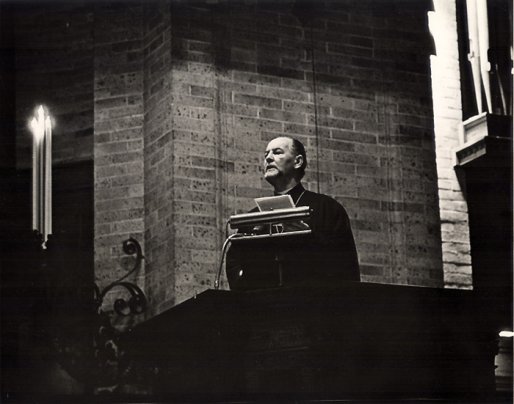
A MESSAGE UNCHANGED
And who knows whether it may not be the real mission of Orthodoxy in America to change the American culture which has never really been challenged by a different set of values? No doubt Orthodoxy has an understanding of man, life, world, nature, etc., radically different from those prevailing in American culture, but this difference itself is a challenge for Orthodoxy rather than a justification for withdrawal, negativism, and fear. To avoid the two extremes, to be truly Orthodox yet fully American, seems to be the only real Orthodox tradition. How and where do we then begin?
I have already said I have no ready-made answers. I do, however, have a few thoughts which I would like to share with you–a few thoughts about the conditions which may set us on the difficult path. One of the great dangers of modern, and especially American, culture is its reduction of man to history and to change. This is the first thing we Orthodox have to denounce and to resist. We must openly confess that there are things which do not change, that human nature does not, in fact, change; that such realities as sin, or righteousness, or holiness do not depend on the changing pattern of culture.
How many times I have heard, for example, that in “our age” the concept of sin must be changed if it is to be relevant to modern man. How many times we have heard that in “our age” we cannot speak of the Devil. Yet I am absolutely convinced that sin is exactly the same for me as it was for Saint Paul, and that if there is no Devil, Christianity is no longer the same religion it was for nearly two thousand years. It is not enough to speak, as some Western theologians do, of the “demonic.” It is not enough to identify sin with alienation. And it is at this point that Orthodoxy has a tremendous responsibility, for it is fundamentally the belief in unchanging realities, it is the denunciation of all “reductions” as not only doctrinally wrong, but existentially destructive.
Thus, the first condition for anything else is simply faith. Before anything else is possible, before I can speak of myself as belonging to this or that generation, as immigrant or native, of our age as technological or post-industrial, etc., there is this one fundamental reality: man standing before God and finding that life is communion with Him, knowledge of Him, faith in Him, that we are created literally for God.
Without this experience and affirmation, nothing has meaning. My real life is in God and in heaven. I was created for eternity. These simple affirmations are rejected as naive and irrelevant today, and in spite of all its Christian terminology. Western Christianity becomes more and more a man-centered humanism. At this point, no compromise is possible, and everything depends upon whether Orthodoxy will remain faithful to its God-centeredness, to its orientation toward the Transcendent, the Eternal, the Divine.
We do not deny that men need justice and bread. But before everything else they need God. Thus, we truly can do what we are called to do in spite of all temptations. The seemingly “charitable” character of these temptations misses the unchanging truth that our call is not only to proclaim or to defend, but first of all to live this unchanging, eternal hierarchy of values in which God and God alone is the beginning, the content, and the end of everything. This is the real content of the Orthodox faith, of our liturgy, of our sacraments. This is what we celebrate on Easter night. This is what is revealed at the Eucharistic Table. It is always the same thing, the same prayer, the same joy: “Thy Kingdom come … ” It is the understanding of life as indeed preparation, not simply for an eternal rest, but for the life which is more real than anything else–a life of which this life is but a “symbol” and a “sacrament”
I can hear and sense the reaction: “Oh, again paradise and hell; is that Christianity? Can this be preached in the twentieth century?” And I will answer: “Yes, it is. Yes, it can.” It is because so many people today have forgotten this, it is because all this has become “irrelevant” for Christians themselves, that so many are in hell already. And Orthodoxy will lose all its salt if each one of us does not strive first of all for this personal faith and for this hunger for salvation, redemption, and deification. Christianity begins only when we take seriously the words of Christ: “Seek first the Kingdom of God and His righteousness; and all things shall be added unto you” (Matthew 6:33).
A VISION FOR THE FUTURE
But now let me share with you my second preliminary thought Just as each one of us must discover for himself the “unchanging” and take part in the same, never-ending, spiritual fight, we must discover ourselves as belonging to one particular generation of Orthodox Christians living in the twentieth century in America, in a secular and pluralistic culture and in the midst of a great spiritual crisis.
What can we do together? What are the Orthodox imperatives for our common and corporate task? I think that here the priorities are rather clear, especially when one speaks to students and for students, for “student” is today the purest representative of what I call the second Orthodoxy in America. The first one–whether he came from the “old world” or was born here–is still an immigrant in his mentality. He lives within the American culture but is not yet an organic part of it.
A student is by definition someone who can and must reflect. So far Orthodoxy in America has not reflected upon itself and upon its situation here. The Orthodox student is the first Orthodox who is called to reflect on his life as an Orthodox in America. On this reflection depends the future of our Church here, for this reflection will obviously be aimed at the problems which I mentioned earlier. So this is a crucial task. You will say either yes or no for the entire Orthodox Church on this continent.
To say yes, however, means to rediscover the Church as mission, and mission within our present situation means something more than simply converting individuals to Orthodoxy. It means primarily an evaluation of American culture in Orthodox terms, and this is the real mission of the Orthodox “intelligentsia,” for no one else can do that.
THE ESSENTIALS OF ENCOUNTER
It is here that I must stress again the fundamental quality of American culture: its openness to criticism and change, to challenge and judgment. Throughout the whole of American history, Americans have asked: “What does it mean to be American?” “What is America for?” And they are still asking these questions. Here is our chance, and here is our duty. The evaluation of American culture in Orthodox terms requires first a knowledge of Orthodoxy, and second a knowledge of the true American culture and tradition.
One cannot evaluate that which one does not know, love, and understand. Our mission, therefore, is first of all one of education. We–all of us–must become theologians, not in the technical sense of the word, but in terms of vital interest, concern, care for our faith, and above everything else, in terms of a relationship between faith and life, faith and culture, faith and the “American way of life.”
Let me give you one example. We all know that one of the deepest crises of our culture, of the entire modern world, is the crisis of family and the man-woman relationship. I would ask, then: How can this crisis be related to and understood in terms of our belief in the one who is “more honorable than the cherubim and beyond compare more glorious than the seraphim. . . “–the Theotokos, the Mother of God, the Virgin?
Where all this will lead us, I do not know. In the words of a hymn of Cardinal Newman: “I do not see the distant scene, one step enough for me.” But I know that between the two extremes–of a surrender to America, of a surrender of America–we must find the narrow and the difficult way of the true Orthodox Tradition. No solution will ever be final, and there is no final solution in “this world.”
We shall always live in tension and conflict, in the rhythm of victory and defeat. Yet if the Puritans could have had such a tremendous impact on American culture, if Sigmund Freud could change it so deeply as to send two generations of Americans to the psychoanalytical couch, if Marxism, in spite of all its phenomenal failures, can still inspire presumably intelligent American intellectuals, why can’t the faith and the doctrine which we claim to be the true faith and the true doctrine have its chance? “O ye of little faith …. ”
Marx and Freud never doubted, and they won their vicious victories. The modern Christian, however, has a built-in inferiority complex. One historical defeat pushes him either into an apocalyptic fear and panicking, or into a “death of God” theology. The time has come, perhaps, simply to recover our faith and apply it with love and humility to the land which has become ours. And who can do that if not those who are given a full share in American culture?
Two things, then, are essential: first, the strengthening of our personal faith and commitment. Whether priest or layman, man or woman, the first thing for an Orthodox is not to speak about Orthodoxy, but to live it to his full capacity; it is prayer, it is standing before God, it is the difficult joy of experiencing “heaven on earth.” This is the first thing, and it cannot be reached without effort, fasting, asceticism, sacrifice, or without the discovery of that which in the Gospel is called the “narrow way.”
And second, to use a most abused word, there must be a deep and real dialogue with America–not accommodation, not a compromise, for a dialogue may be indeed violent. If nothing else, it will achieve two things. It will reveal to us what is real and genuine in our faith and what is mere decoration. We may, indeed, lose all kinds of decorations which we erroneously take for Orthodoxy itself. What will remain is exactly the faith which overcomes the world.
In that dialogue we will also discover the true America, not the America which so many Orthodox curse and so many idolize, but the America of that great hunger for God and His righteousness which has always underlain the genuine American culture. The more I live here, the more I believe that the encounter between Orthodoxy and America is a providential one. And because it is providential, it is being attacked, misunderstood, denied, rejected on both sides. Perhaps it is for us, here, now, today to understand its real meaning and to act accordingly.
THE MISSION OF ORTHODOXY
We know that the Orthodox youth of America must have a mission. And the first condition for mission is a spiritual foundation; we simply cannot move anywhere without faith and a personal commitment to Christian life. Further, it seems that we must think of our mission in terms of the particular situation we face in America, in this thoroughly secularized society.
But, what is a mission? Mission is one of those words much used and much abused today in America. So we must, first of all, clarify its meaning for us. On the one hand it is clear to all, I hope, that in a sense every Christian is called to be a missionary. Every Christian is sent. When we say “One, Holy, Catholic and Apostolic Church,” the term “apostolic” means not only the continuity of ministry, as so many people seem to think, but also the apostolicity, i.e., the missionary nature of the Church and of each of her members.
My being a missionary can be understood in a threefold way. In the first place, I am sent to myself. This means that the new Adam in me is always ready to challenge and to fight the old Adam–the “I” who is still very much “of this world” and subdued to it.
In the second place, I am sent to others. This again is universal, and is not limited to bishops, priests, and missionaries in the strict sense of the word.
And finally, I am sent as a missionary to the world. The scope of our vision and faith is always the salvation of all that for which Christ died, and He died “for the life of the world.” Thus, one cannot be saved without giving oneself to this mission. Everyone is a missionary .
Yet, on the other hand, as we begin seeking for concrete applications of these general definitions, the idea of mission becomes confused. It is indeed the eternal problem for each Christian individually and for every Christian generation to find their modality of mission–the way God wants them to fulfill their missionary calling. Just as each man is unique, the way of his fulfillment of his vocation is also unique. And just as each historical situation is unique, the Christian mission of each generation is also in a way unique. This is why there are so many disagreements and controversies among Orthodox today. Everyone admits that something needs to be done, but there is no consensus yet on what exactly is to be done and how. The disagreements concern, indeed, the nature of the Orthodox mission today.
THE PAST AND OUR TRADITION
In such a situation, we must always begin by looking to the past, by consulting with our tradition–not “archaeologically,” with an impossible, unrealistic, and futile desire simply to “restore” the past, but in an effort to discern the mind of the Church. The entire history of the Church is in a way the history of her mission, that is, of her relation to and action in the world. And as we look into that past, we discover there a rhythm, which I think could be defined as the rhythm of crisis and consolidation.
Consider, for example, the Book of Acts, the earliest record of the Church’s life. It begins with an almost idyllic description of the first community in Jerusalem. The Church is growing, she is liked by all people, she is at peace. The difficulties–like the one with the couple who tried to lie and cheat–are quickly solved. Then comes the crisis, which is primarily a radical change in the external–cultural and spiritual–context within which she has to live.
Suddenly there are new problems facing the Church and disturbing her initial peace. There is the problem of mission to the non-Jews, the problem of circumcision, the concerns about the Jewish way of life–not even questioned before. It is, in other words, a crisis of growth, which is always painful and bitter. The Apostle Paul–the bearer and the symbol of the crisis–knew that without facing it, the Church would have remained a little Jewish sect and would never have been the universal challenge, the universal “question mark,” on everything in this world–all that she actually did become because of that first crisis.
But then a period of consolidation begins. From the midst of the second until the end of the third century, we discern a constant effort to do just that: to consolidate, to organize, to define the life of the Church, to build it on clear and solid principles–the apostolic succession, the apostolic constitutions, the apostolic traditions, the canon of Scripture. On the eve of Constantine’s conversion the Church exists as a well organized institution, “adjusted” to her universal mission, with a well-oiled mechanism for the solution of her daily problems.
There comes, however, a new crisis, provoked this time by the conversion of the Emperor and–in him–of the entire Graeco-Roman society. The Empire, which to the Church was the very symbol of the Antichrist, the Harlot, the new Babylon, becomes Christian. And it becomes Christian by a direct intervention of Christ Himself, who elects Constantine to be a “second Paul.” Once more the entire framework of the Church’s life is radically altered. There comes not only security and peace, but also wealth and privileges, the splendor of new basilicas, the rain of gold and silver, the political power, the new social status.
The bishops who only yesterday were in prison or in hideouts are invited to come to Nicea at the expense of the State, receive a “red carpet” treatment, and are submerged with gifts and honors. All this is so new, so unheard of! No wonder it provokes a crisis in the very consciousness of the Church.
The best proof of the new crisis is the great monastic exodus of the fourth century. At a time when Christians seem finally to enjoy all power, all possibilities, at this very time the best Christians, in tremendous numbers, leave for the desert. Yet, the important point here is that this very exodus becomes the starting point of a new consolidation, of the creative adjustment of the Church to her new situation in the world. For without the monastic exodus and challenge, the Church would have been in danger of accepting too easily her new and privileged “status”: that of the State religion, of identifying herself with a culture, of losing the intensity of her eschatological prayer: “Thy Kingdom come!”
It was the monk who, by preserving Christian maximalism and forcing it into the very texture of the Empire, laid in fact the foundations of the “Orthodox world” with its inner and creative tension between “heaven” and “earth.” What indeed made that Christian world Christian, in spite of its many defects and shortcomings, is the fact that it never reduced man to anything–be it economics, or society, or culture–for it always remembered the eternal and divine vocation of man, always kept the Kingdom of God as its ultimate value. It always knew that man is a sinful creature called to heavenly glory, to the “honor of a high calling.”
POST-CHRISTIANITY
Our situation today is once more that of crisis, and it is the nature of that crisis that is to shape the orientation of our missionary effort. The fundamental meaning of the crisis lies in the fact that the Christian world born out of Constantine’s conversion, and the subsequent “symphony” between the Church, on the one hand, and the society, state, and culture, on the other, has ended.
Please do not misunderstand me. The end has come not of Christianity, not of Church or faith, but of a world which referred, however nominally at times, its whole life to Christ and had Christian faith as its ultimate criterion. All dreams about its restoration are doomed. For even if Christians were to recover control of states and societies, that would not automatically make these societies “Christian.” What happened occurred on a much deeper level.
The fact is we are no longer living in a Christian world. The world we live in has its own style and culture, its own ethos, and, above everything else, its own worldview. And so far Christians have not found and formulated a consistently Christian attitude towards the world and its worldview and are deeply split in their reaction to it. There are those who simply accept the world’s view and surrender to secularism.
And there are those whose nervous systems have not withstood the shock of the change and who, faced by the new situation, are panicking.
If the first attitude leads little by little to the evaporation of faith itself, the second threatens us with the transformation of Orthodoxy into a sect. A man who feels perfectly at home in the secular and non-Christian world has probably ceased to be a Christian, at least in the traditional meaning of that term. But the one who is obsessed with a violent hatred and fear of the modem world has also left the grounds of the genuine Orthodox tradition. He needs the security of a sect, the assurance that he at least is saved in the midst of the universal collapse. There is very little Christianity and Orthodoxy in either view. If some forget that the Kingdom of God is “not of this world,” the others do not seem to remember that “perfect love overcomes all fear.”
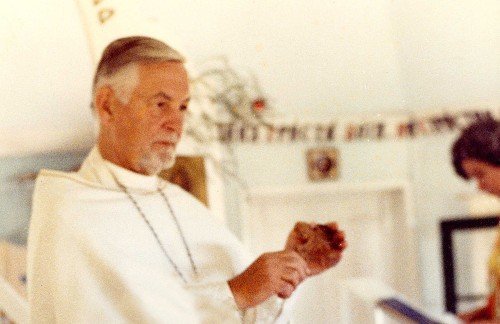
A TWOFOLD MISSIONARY PERSPECTIVE
If, as I said above, it is the very nature of the present crisis that must shape our missionary perspective, that perspective, in my opinion, consists of two fundamental attitudes, two urgent tasks.
1. We must maintain at all costs that which many people today contemptuously call the Christian institution. It takes some courage in our day to defend the institution against the powerful and anti-institutional trend which exists both on the right and on the left. It is indeed the ironic paradox of our time that the ultraconservatives are at one with the ultra-radicals in undermining the institution.
The ultra-conservatives, by constantly measuring and comparing the “spirituality” or the “orthodoxy” of bishops and jurisdictions, appoint themselves as judges, setting the criteria and deciding charismatically whom they accept and whom they reject. In other words, they take upon themselves the decisions that belong to the Church and end up replacing the Orthodox doctrine of the Church with a new variety of Donatism or Montanism, heresies of misplaced and misdirected maximalism which, just because of their perceived maximalism, were the most difficult to destroy.
The ultra-radicals simply reject the very principle of institution, which to them seems boring and alienating, and are ready to revise and re-evaluate everything in the light of their own supposedly “charismatic” insights. Here and elsewhere we find a common, deep misunderstanding of the Church: the relationship in her between the institutional and the charismatic. And this misunderstanding is rooted, above all, in the lack of the fundamental Christian virtue: humility.
It is difficult, yet necessary, to say to young people who want excitement and maximalism, immediate action and spectacular achievements: “Your first duty, your first spiritual achievement, consists precisely in accepting the institution, and doing so on its own terms, not yours. It consists in becoming deeply and humbly-part of it”
For what is institution? It is the very fact of the presence and continuity of the Church, always the same, in the world, regardless of all crises, of all changes. It is the guarantee that whether there are prophets or not, whether there are saints and leaders to inspire and lead us, there will be a priest standing at my bed at the hour of my death, pronouncing words of hope, joy, and victory which he did not invent and may even have not felt, but which through him have been preserved by the Church. It is the guarantee that Sunday after Sunday someone–who may be good, bad, or mediocre–will have the right and the duty to offer to God “His own of His own on behalf of all and for all” and thus to make possible all charisms and all inspiration.
2. There must be a faithful remnant which relates to the world as it is today. This is the second task, the one that could be performed beyond the unchanging limits of the institution, and which is determined by the specific situation in which the Church finds herself at any particular period of her history. If the proper function of the institution is to maintain and to make available always and everywhere the unchanging essence of the Christian faith and the Christian life this mission deals with this or that particular situation, with the world as it is now. Again, this mission is always the task of a remnant.
To me the answer is comprised in one word: movement. What the Church needs today, as it has needed it on several occasions in the past, is a dynamic movement of young men and young women, a kind of “order” to fulfill the tasks that institution alone cannot and must not fulfill. If the inner core of such a movement is to consist mainly, if not exclusively, of students, it is because a student is by definition a being whose life is yet open and available.
But the emphasis, of course, is not on “student” but on “movement.” The student, as any other member of such a movement, is its subject and agent, not object. The movement is, in other words, to be directed at the tasks to be performed for the Church and not at some specific “student needs .”
VOWS FOR TODAY
I have in mind a kind of spiritual profile of that movement and of those who will take part in it. To me, it looks in some way like a new form of monasticism without celibacy and without the desert, but based upon specific vows. I can think of three such vows.
1. PRAYER: The first vow is to keep a certain well-defined spiritual discipline of life, and this means a rule of prayer: an effort to maintain a level of personal contact with God, what the Fathers call the “inner memory of Him.” It is very fashionable today to discuss spirituality and to read books about it. But whatever the degree of our theoretical knowledge about spirituality, it must begin with a simple and humble decision, an effort, and–what is the most difficult–regularity. Nothing indeed is more dangerous than pseudo-spirituality whose unmistakable signs are self-righteousness, pride, readiness to measure other people’s spirituality, and emotionalism.
What the world needs now is a generation of men and women not only speaking about Christianity, but living it. Early monasticism was, first of all, a rule of prayer. It is precisely a rule we need, one which could be practiced and followed by all and not only by some. For indeed what you say is less and less important today. Men are moved only by what you are, and this means by the total impact of your personality, of your personal experience, commitment, dedication.
2. OBEDIENCE: The second vow is the vow of obedience, and this is what present-day Orthodox lack more than anything else. Perhaps without noticing it, we live in a climate of radical individualism. Each one tailors for himself his own kind of “Orthodoxy,” his own ideal of the Church, his own style of life. And yet, the whole spiritual literature emphasizes obedience as the condition of all spiritual progress.
What I mean by obedience here, however, is something very practical. It is obedience to the movement itself. The movement must know on whom it can depend. It is the obedience in small things, humble chores, the unromantic routine of work. Obedience here is the antithesis not of disobedience, but of hysterical individualism. “I” feel, “I” don’t feel. Stop “feeling” and do. Nothing will be achieved without some degree of organization, strategy, and obedience.
3. ACCEPTANCE: The third vow could be described, in terms of one spiritual author, as “digging one’s own hole.” So many people want to do anything except precisely what God wants them to do, for to accept this and perhaps even to discern it is one of the greatest spiritual difficulties. It is very significant that ascetical literature is full of warnings against changing places, against leaving monasteries for other and “better” ones, against the spirit of unrest, that constant search for the best external conditions. Again, what we need today is to relate to the Church and to Christ our lives, our professions, the unique combination of factors which God gives us as our examination and which we alone can pass or fail.
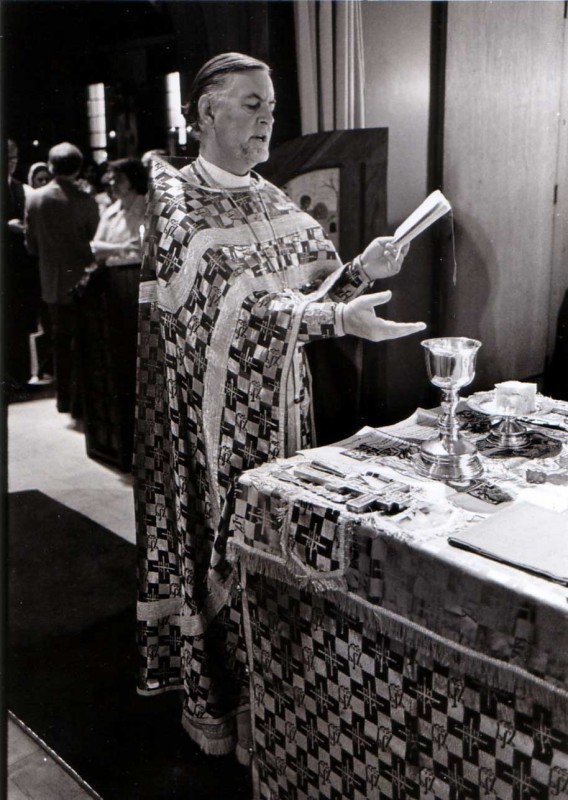
THE TASK AHEAD
One might ask, what would a movement of this kind set as its goals? What would be its mission?
The first goal would be to help people, and first of all the movement’s own members, to experience and to live their Orthodox faith. We all know there exists today a real discrepancy between the Orthodox ideal of the Church–of “sobornost,” of liturgical life–and reality. There must be a place, a situation, where this ideal can be tasted, experienced, lived, be it only partially and imperfectly. Here the experience of other Orthodox movements is conclusive. It is because their members experienced–at their conferences, retreats, study groups–the joy and the meaning of Church life that they could witness to it and call to the Church “at large.”
Then the second goal of our mission can be termed intellectual. We are living at a time and in a situation in which all, not only professional theologians, are called to know and to be ready to confess. Our time is the time of a gigantic ideological struggle. Without a new concern by the Orthodox about the content of their faith and its implications for their entire life, our Church will lose.
Finally, the movement is to care about those needs of the Church about which a parish or a diocese does not or cannot care: reaching youth, finding the total place and function of the Church in our world, accepting–creatively–the challenges of modern culture. All this is our task because being not of this world we are in it, left in it to witness and to reveal.
All this will take time to build. Yet we must think in terms of a remnant, of a movement, of service. We must begin with ourselves, if we are to be of service to the Church. When God gives something, a talent, He wants us to invest it. He wants us to serve.
There is no other way of following Christ.
[Adapted from a lecture given at the 1968 National Conference of Orthodox College Students and printed in Volume III, No.4 of CONCERN (no longer in publication).]













